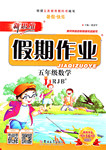题目内容
根据短文内容,从短文后的选项中选出能填入空白处的最佳选项。选项中有两项为多余选项。
The jobs of the future have not yet been invented. 1.. By helping them develop classic skills that will serve them well no matter what the future holds.
1.Curiosity
Your children need to be deeply curious. 2.. Ask kids, “What ingredients (配料)can we add to make these pancakes even better next time ?” and then try them out. Ingredients make the pancakes better? What could we try next time?
2. Creativity
True creativity is the ability to take something existing and create something new3.. There are a dozen different things you can do with them. Experimenting with materials to create something new can go a long way in helping them develop their creativity.
3.Personal skills
Understanding how others feel can be a challenge for kids. We know what’s going on inside our own head, but what about others? Being able to read people helps kid from misreading a situation and jumping to false conclusions. 4. . “Why do you think she’s crying?” “Can you tell how that man is feeling by looking at his face?” “If someone were to do that to you, how would you feel?”
4. Self Expression
5. there are many ways to express thoughts and ideas –music, acting, drawing,building, photography. You may find that your child is attracted by one more than another.
A. Encourage kids to cook with you.
B. And we can’t forget science education.
C. We can give kids chances to think about materials in new ways.
D. So how can we help our kids prepare for jobs that don’t yet exist?
E. Gardening is another great activity for helping kids develop this skill.
F. We can do this in real life or ask questions about characters in stories.
G. Being able to communicate ideas in a meaningful way is a valuable skill.
 新思维假期作业寒假吉林大学出版社系列答案
新思维假期作业寒假吉林大学出版社系列答案

 itics; I just wanted to go there.
itics; I just wanted to go there.